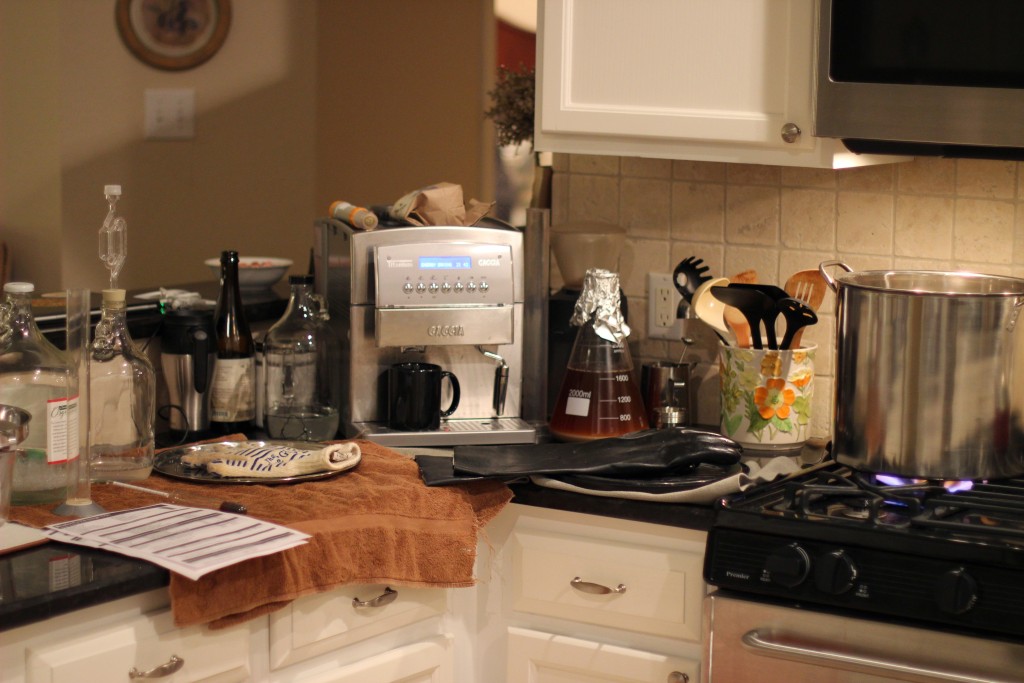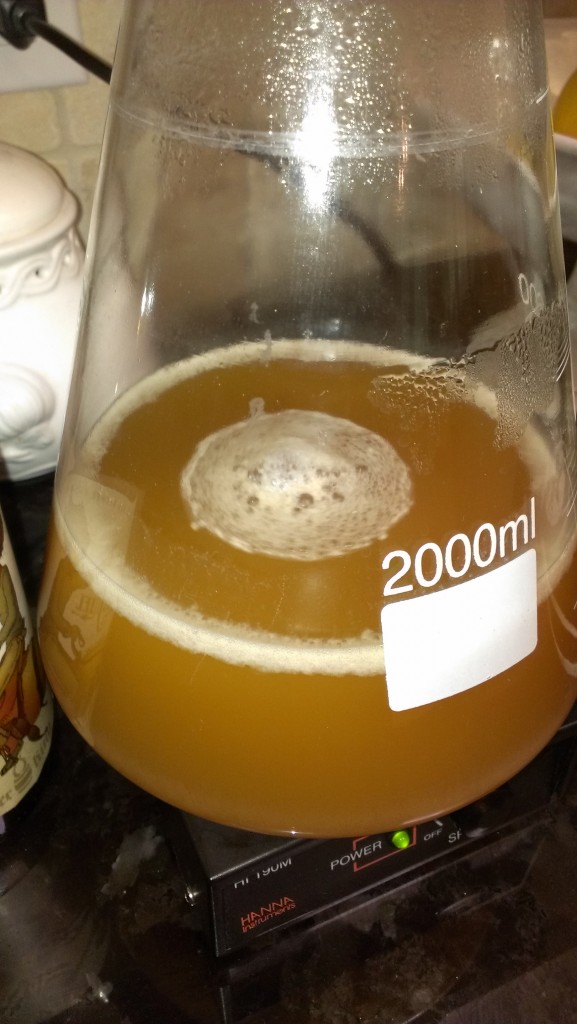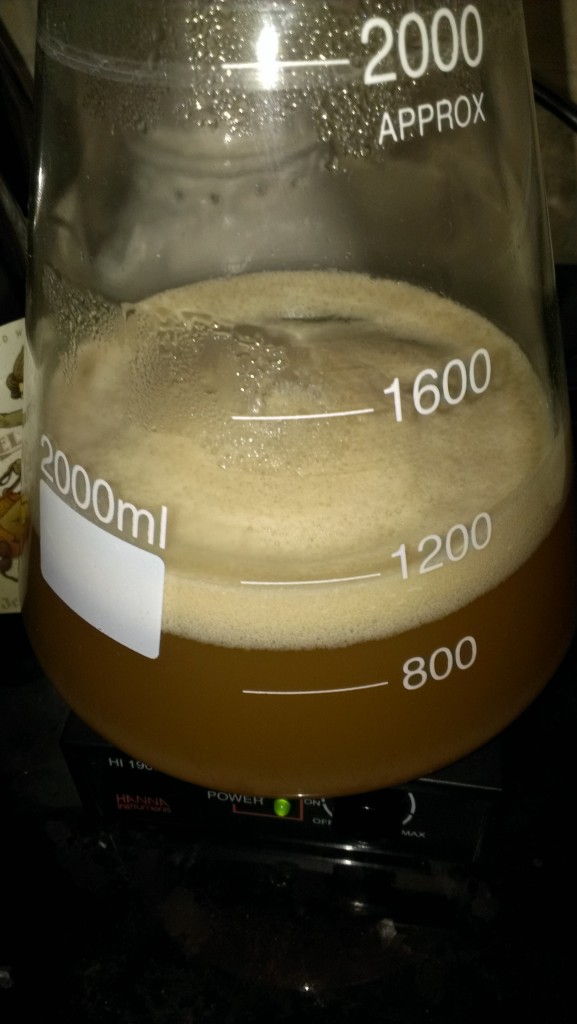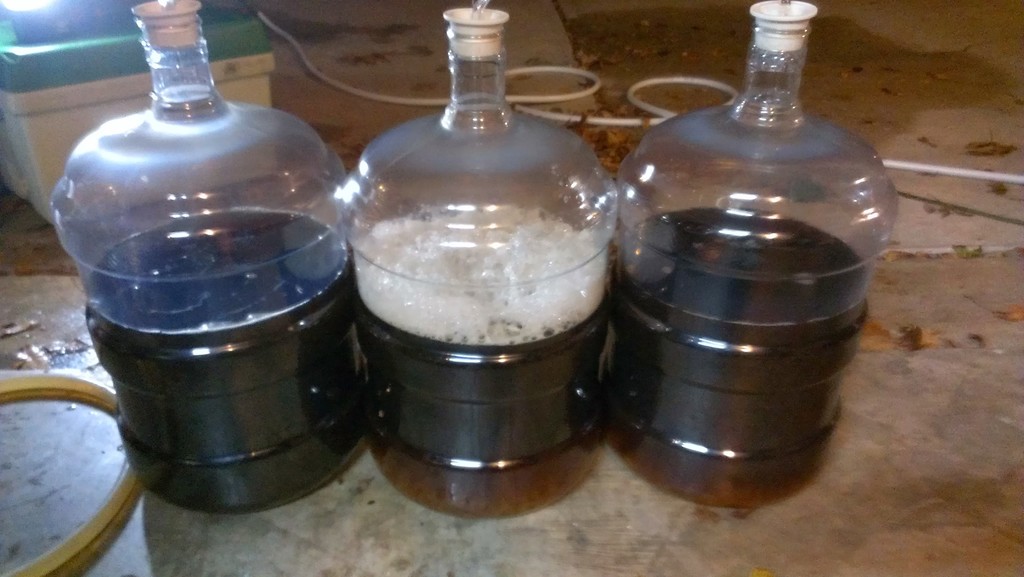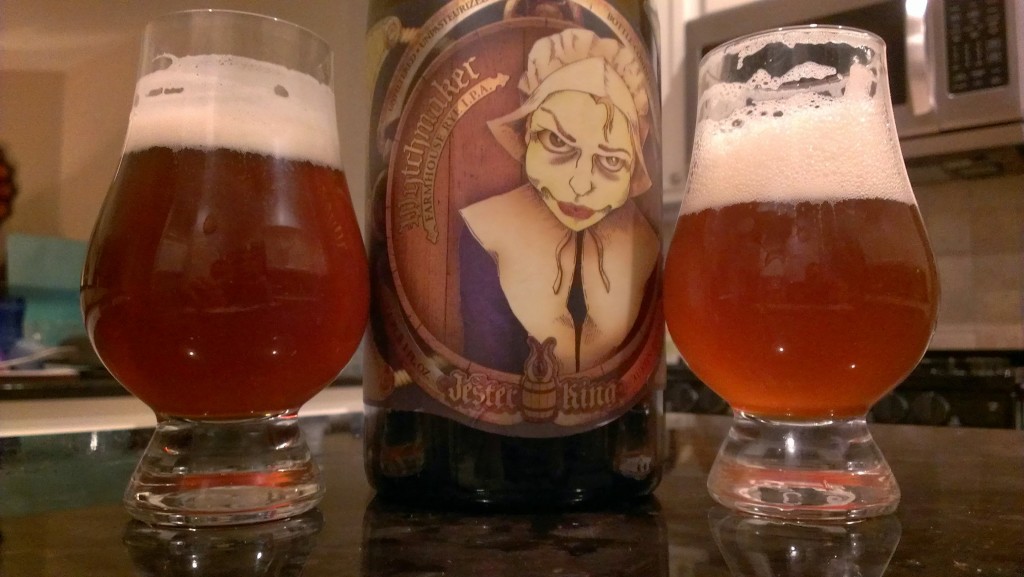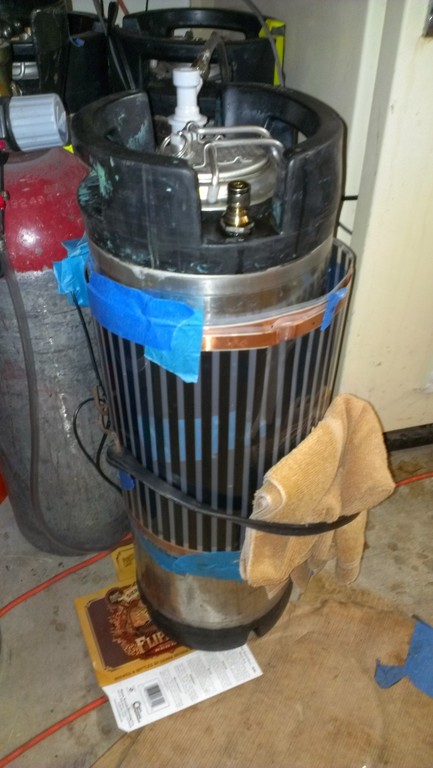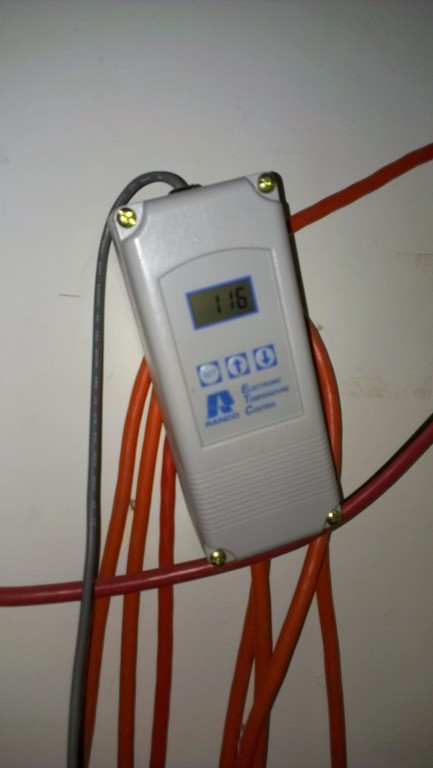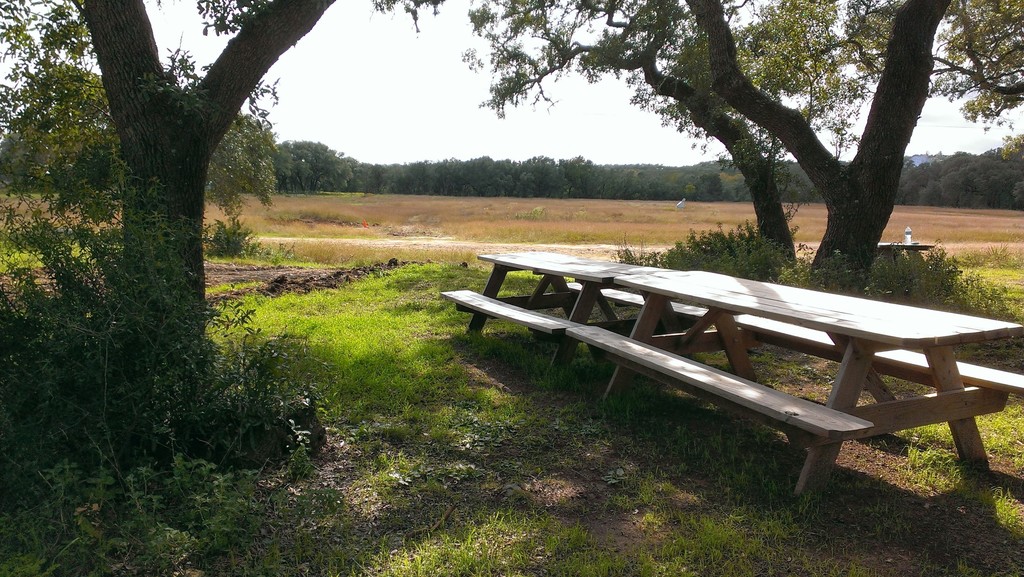It’s that time again; cooler weather in Texas brings on the lambic-style season. I’ll be brewing a second batch of Woxbic in a few weeks. In the last post I mentioned that things would be slowing down and the rate of posting shows.
Since the last post, the two batches of Saison with wild yeast fermenting at different temperatures have been bottled. It’ll be another few weeks before we have carbed bottles for tasting but the whole experience was interesting. Initially the hot fermentation produced a more sour beer, but eventually the tartness faded before bottling. The cold-side took quite a while to take off, mostly due to my lack of yeast starter. I had a huge pitch, but it wasn’t fresh. The cold side ended up much smoother in flavor profile. The hot fermentation picked up an odd flavor (not mousy, though that showed up as well). In any case, I dry-hopped both with some tasty hops and shortly we’ll have a tasting.
The whole experience of brewing 11 gallons, fermenting two batches, dry-hopping, and then bottling, possibly leaving me with 4 cases of beer that may not work out seems a bit excessive given the experimental nature of the batches.
This though has led me to work with smaller batches. In fact, one of the local homebrewers who has won NHC medals uses exactly this method for honing and tweaking a recipe. With that decided, I picked up a 5 gallon pot and a mini siphon and decided to have at it.
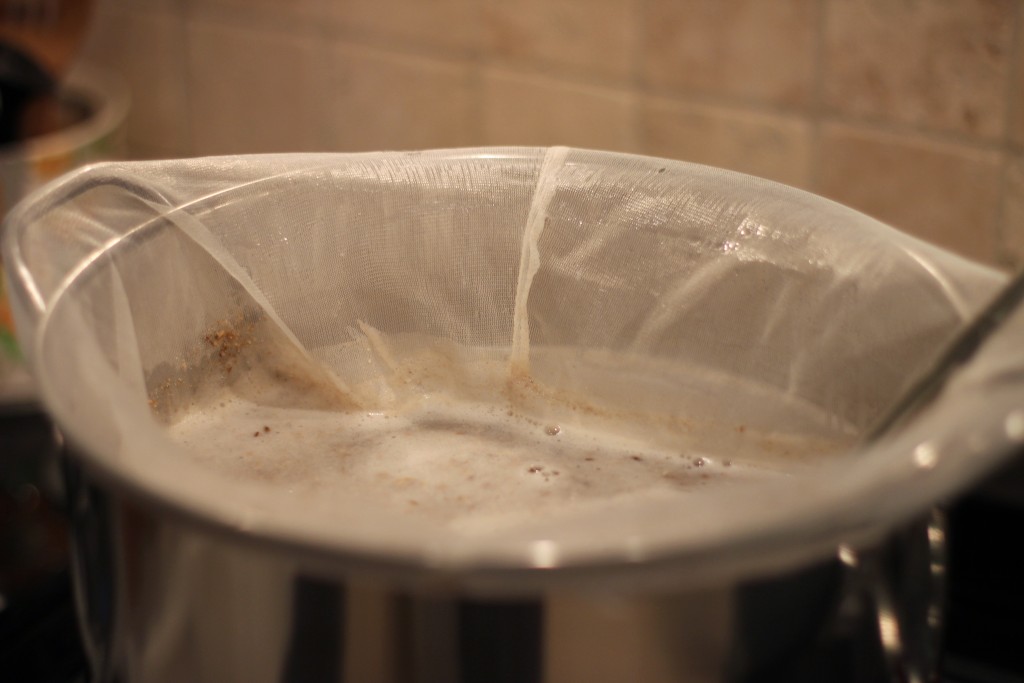
I completed a 1G recipe, Brew in a Bag (BIAB) mash to reduce the number of vessels and work with the grains I had on hand rather than purchasing Dry Malt Extract or Liquid. I had hoped that this smaller batch would mean for a shorter brew night, but it was roughly equivalent. Mostly due to the stove burner being just adequate for the 3 gallons of liquor. 20 minute strike temp, 1 hour mash, 10 minute raise to boil, 75 minute boil, 20 minute chill, plus cleanup and prep time. About 4 to 5 hours.
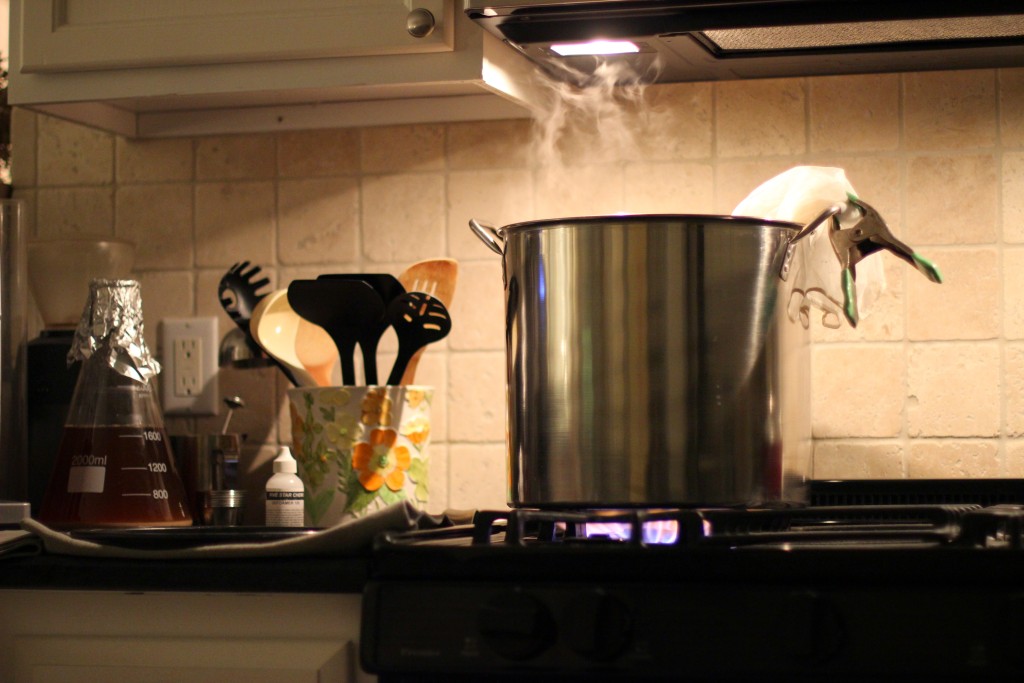
The good news was all of that brewing at a larger scale translates just fine; I didn’t forget anything and I netted about 1.5 gallons (slightly under gravity target, but I didn’t want to boil any longer for fear of raising the IBUs too high). I had recently stepped up a fresh dump of Jester King Brewery yeast picked up from Jester King itself. My friend had fermented a few beers with it and was astonished at how violent it ferments at sub 60F temps.
Let’s just say, it’s still working =)
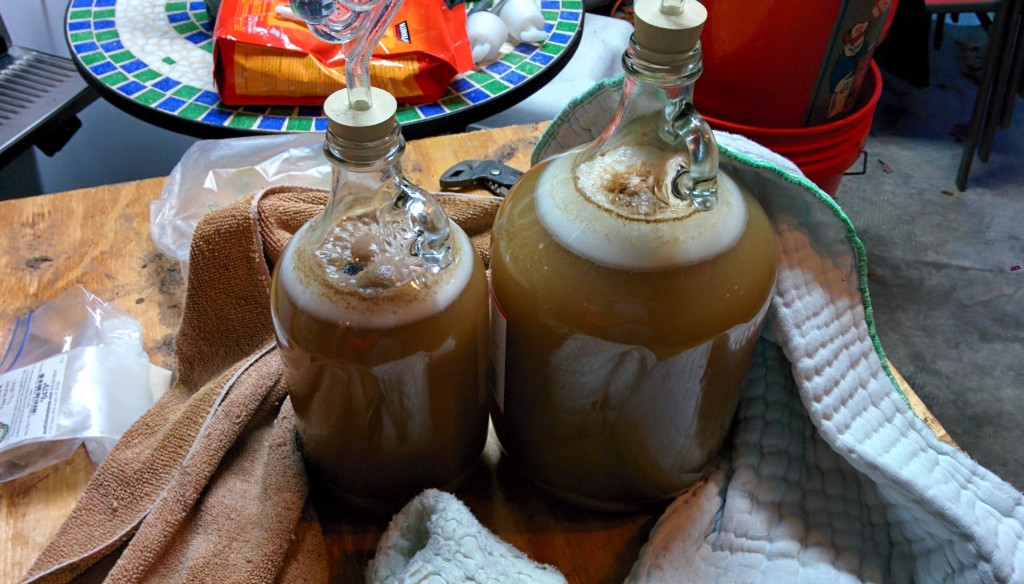
Ill let you know how it’s going in about 4 weeks.
Updated: Added recipe file and notes.
Recipe Details
| Batch Size | Boil Time | IBU | SRM | Est. OG | Est. FG | ABV |
|---|---|---|---|---|---|---|
| 1 gal | 90 min | 23.1 IBUs | 7.0 SRM | 1.078 | 1.015 | 8.3 % |
| Actuals | 1.068 | 1.005 | 8.3 % | |||
Style Details
| Name | Cat. | OG Range | FG Range | IBU | SRM | Carb | ABV |
|---|---|---|---|---|---|---|---|
| Straight (Unblended) Lambic | 17 D | 1.04 - 1.054 | 1.001 - 1.01 | 0 - 10 | 3 - 7 | 1.8 - 2.6 | 5 - 6.5 % |
Fermentables
| Name | Amount | % |
|---|---|---|
| Pilsen (BestMälz) | 2.613 lbs | 73.8 |
| Wheat Malt, Ger | 13.7 oz | 24.18 |
| Carapils (Briess) | 0.9 oz | 1.59 |
| Chocolate Malt (Thomas Fawcett) | 0.25 oz | 0.44 |
Hops
| Name | Amount | Time | Use | Form | Alpha % |
|---|---|---|---|---|---|
| Styrian Goldings | 0.47 oz | 60 min | Boil | Pellet | 3 |
| Cascade | 0.17 oz | 7 days | Dry Hop | Pellet | 5.9 |
| Centennial | 0.17 oz | 7 days | Dry Hop | Pellet | 11.4 |
Miscs
| Name | Amount | Time | Use | Type |
|---|---|---|---|---|
| Phosphoric | 11.80 ml | 60 min | Mash | Water Agent |
| Epsom Salt (MgSO4) | 0.60 g | 60 min | Mash | Water Agent |
| Calcium Chloride | 0.30 g | 60 min | Mash | Water Agent |
| Gypsum (Calcium Sulfate) | 0.30 g | 60 min | Mash | Water Agent |
Yeast
| Name | Lab | Attenuation | Temperature |
|---|---|---|---|
| French Saison (3711) | Wyeast Labs | 84% | 65°F - 77°F |
| Brettanomyces Bruxellensis (WLP650) | White Labs | 70% | 65°F - 72°F |
| Brettanomyces Lambicus (WLP653) | White Labs | 70% | 65°F - 72°F |
Mash
| Step | Temperature | Time |
|---|---|---|
| Saccharification | 156°F | 60 min |
| Mash Out | 168°F | 10 min |
Notes
| Mash went fine, though lost about 2 to 3 degrees with pot in the oven, preheated to 200. Dough in should have been 160, but stirred in at 157. Ended up with a 154 strike temp and ended up at 150. Boil was easy, probably took 20 minutes to get there from 150s. Held for 15 minutes with no hops to reduce water, added hops (60 minute addition), after 60 pulled hops, boiled for another 15, for total 90 minutes. O.G was low (1.068) but yield was high, 1.5G instead of 1. Can't tell if I had too much water or not. Recipe called fro 3.2 gallons, and measured by weight (8.35 lb per gallon => 26 lbs of water). Chilled in sink, accidential minor dillution. Chill time approx 20 minutes, with vigorous stirring until temp is about 117, then rested in water for another 10 minutes. Pitching temp was about 72F. Stored in 58F garage, signs of fermentation present in 12 hours. 2015-01-12 full active fermentation in full swing. Ambient 55F, infrared reading of top layer of wort about 57F. 2015-01-17 -- pull 2 oz sample. Not enough for hyrometer, so utilized a refractometer. Reading was 6.8 Brix, with no correction factor, and O.G of 1.068, this puts the S.G at 1.009. pH reading shows 3.63. Lots of barnyard funk in the nose, cloudy yellow. Taste is a bit hoppy, slight tartness, some malt flavors. Obviously green beer, but not entirely bad. Drank the whole sample. 2015-01-22 -- (Pulled from .5 gallon jar vs. 1G jar) Reading 6.5 Brix with no correction, O. of 1.068, calc says S.G at 1.08. pH reading at 3.50 @ 66.6F. Nice funk, a bit flora, less cloudy. Solid sour bit, followed by some sweet pilsner flavors, a touch grainy, subtle hopiness. Tastes really good right now. Not much oak in there, yet; might add a few more cubes and see where it is in a week. |
Download
| Download this recipe's BeerXML file |

